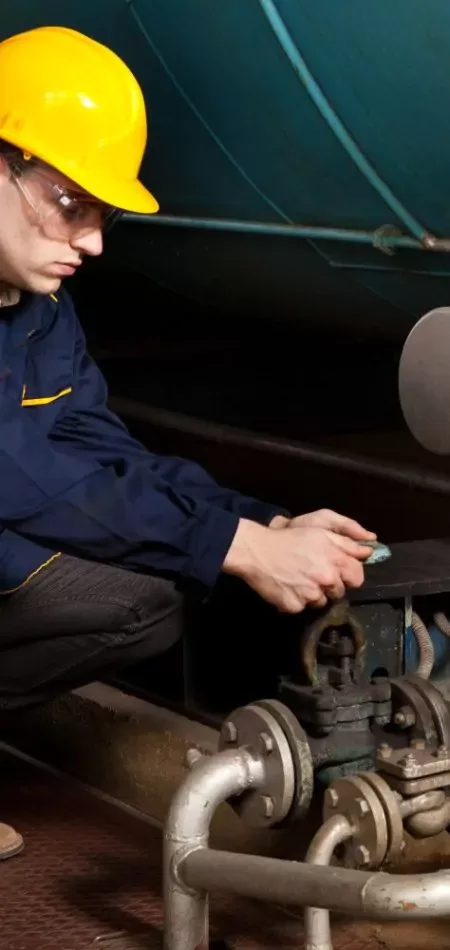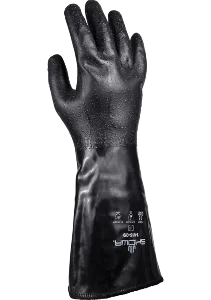Neoprene Gloves for Oil & Gas Industry
Oil and gas, a capital-intensive global powerhouse, relies on highly complex technology and demands a skilled workforce equipped with the best oil-resistant gloves, like neoprene gloves, to engage with heavy machinery daily. This industry, essential for meeting the world’s energy needs, is marked by its multifaceted operations spanning exploration and extraction to transportation and refining. The sector can be broadly categorized into three main segments – upstream, midstream, and downstream – each playing a distinct role in the intricate process of bringing hydrocarbons from their source to the end consumer.
Why Workers Need Oil-Resistant Gloves in Oil & Gas Industry
Without proper PPE, workers are prone to physical damage and chemical hazards, eventually restricting them from performing to their full potential.
Ergonomic-related risks
➤ Daily tasks in the oil and gas industry, such as repetitive lifting, pulling, pushing heavy loads and working in awkward body postures, eventually lead to musculoskeletal disorders.
Machine hazards
➤ Oil and gas extraction workers who handle, guard, and operate heavy and complicated structure machines are prone to injuries when struck by, cut by, or caught between the machines.
Electrical risks and harmful chemicals
➤ Working with high-pressure, electrical, hydraulic, and mechanical equipment is common among oil and gas workers; thus, they are exposed to oil and toxic fluids blasts or leakage and other hazardous energy such as heat and thermal.


Why Choose Our Oil-Resistant Gloves As Your Solutions
Empowered Productivity
➤ Our exclusive ergonomic designs of protective wear relieve stress faced by workers in daily repetitive tasks and hence increase work efficiency.
Cost-Effective
➤ Our specialized insulating and chemical-resistant gloves are designed to protect oil and gas workers from electrical hazards and toxic chemical spills, resulting in reduced costs of accidents.
Enhanced Durability & Performance
➤ Our glove materials are highly resistant to abrasion and permeation, making them longer-lasting even for heavy-duty use.
Recommended Oil-Resistant Gloves for Oil and Gas Industry
Frequently Asked Questions Regarding Neoprene Gloves
What is a neoprene glove?
A neoprene glove is a type of protective glove made from a synthetic rubber called chloroprene rubber, also known as polychloroprene (CPR) or simply neoprene. This material is created through polymerization, which links smaller molecules to form a larger, stronger one. This makes them known for their flexibility and offers protection against liquids, chemicals, acids, solvents, abrasions, and even cuts and punctures. Due to their insulating properties, they are suitable for use in different situations and environments like household chores, industrial applications, and even fishing or diving. In addition, they are latex-free. This makes neoprene a safe alternative for people with latex allergies that can cause skin irritation, rashes, and even breathing difficulties.
Are neoprene gloves oil-resistant gloves?
Yes, neoprene gloves are a good choice for working with oils. Neoprene itself is naturally resistant to oil and other chemicals. This makes them ideal for various tasks involving lubricants, grease, and cleaning products. However, some heavy-duty industrial applications might require even stronger oil resistance. In those cases, materials like nitrile rubber might be a better option. However, neoprene gloves provide sufficient protection and dexterity for most household and everyday uses involving oil.
What are the types of neoprene gloves and their applications?
There are several types of neoprene gloves designed for various applications, with the key differentiator being the neoprene composition and any additional coatings or materials:
100% Neoprene Gloves: These gloves offer unrivalled flexibility and warmth due to the pure stretch of the neoprene material. They are ideal for activities requiring dexterity in water environments, such as surfing, kayaking, paddleboarding, or diving.
Latex + Neoprene Gloves: A latex coating on the palms and fingers of these gloves enhances grip and handling in wet or slippery conditions. Typical uses include dishwashing, fishing, industrial cleaning, and general work applications.
Nitrile + Neoprene Gloves: Like latex-coated gloves, nitrile offers better chemical resistance while maintaining a good grip. These gloves are suitable for tasks involving mild chemicals, oils, or lubricants.
Neoprene + Nylon/Lycra Gloves: These gloves combine the flexibility of neoprene with the strength and durability of nylon or lycra. They are ideal for applications requiring a balance of skill and protection, such as construction work, gardening, or automotive maintenance.
Chloroprene (CR) Neoprene Gloves: This type offers superior chemical resistance to oil, gas, and many hazardous chemicals. They are the primary choice for applications in the oil and gas industry, chemical processing, or hazardous material handling. However, CR neoprene can be stiffer than regular neoprene, sacrificing some dexterity.
Why is neoprene glove best for the oil and gas industry?
Neoprene gloves form a strong base material for practical gloves in the oil and gas industry. Here’s why they’re important and what to look for:
- Chemical Resistance: Regular neoprene offers some oil resistance, but the key for the oil and gas industry lies in a specific type: Chloroprene (CR) Neoprene. CR neoprene provides superior chemical resistance to oil, gas, and many of the chemicals encountered in this industry.
- Dexterity and Flexibility: While not the most flexible material, neoprene offers a better balance than heavier-duty chemical-resistant gloves. This allows for better grip and manoeuvrability when handling tools and equipment.
Thermal Insulation: Some applications in oil and gas might involve cold environments. Neoprene provides some thermal insulation, keeping hands warm in these conditions.
Do neoprene gloves smell?
Neoprene gloves themselves shouldn’t have a strong odour. However, a faint chemical smell might be present initially, especially from lower-quality gloves. The bigger concern is the odour caused by bacteria growth if the gloves are stored damp or not cleaned properly. Letting them dry completely and washing them regularly helps prevent that unpleasant smell.
Get Neoprene Gloves Built for Oil and Gas
Don’t compromise on safety or dexterity. Our premium neoprene gloves provide exceptional oil resistance, protecting your hands while ensuring the flexibility you need for precision tasks. Order your heavy-duty neoprene gloves from Excia today and experience excellent protection for your hand!





